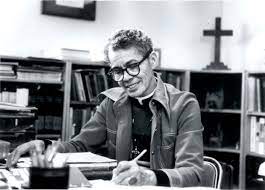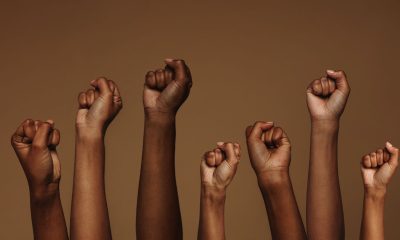Activism
New Documentary Unveils Pauli Murray, Little-Known Civil Rights Activist, Feminist
I’ll admit it; I was not familiar with Pauli Murray. Honestly, Murray’s extraordinary accomplishments in the years before and after the heyday of the Civil Rights Movement are history lessons many of us didn’t know, until now.

I’ll admit it; I was not familiar with Pauli Murray. Honestly, Murray’s extraordinary accomplishments in the years before and after the heyday of the Civil Rights Movement are history lessons many of us didn’t know, until now.
An accessible compilation of mixed media running 91 minutes, “My Name Is Pauli Murray” unearths a revealing journey of extraordinary feats that pre-date the heralded stories of Rosa Parks and Martin Luther King Jr. Pauli Murray knew intimately what it meant to live a life that was out of sync—when even language wasn’t sufficient to define or describe a journey.
Lawyer, professor, poet, and Episcopal priest, Murray was an iconoclast who pushed against the limits—both the conventional and strict legislation and the narrow thinking around issues of race and gender equity. The struggle wasn’t abstract: Murray’s own life —as an African American intellectual whose gender identity felt fluid —personified it.
Born in 1910, in Baltimore, Md., Pauli was taken in at 3 years old by the maternal wing of the family following the sudden death of Pauli’s mother. Embraced by loving grandparents and two aunts—Pauline and Sarah—Pauli exhibited a proficiency in reading and critical thinking, assessing, early on, the vast discrepancies in conditions African-American families lived in as compared to their white counterparts. Murray’s formative years were spent in a segregated North Carolina where she was among the first to integrate classrooms, courtrooms and conferences to sit alongside the world’s most influential powerbrokers.
That gulf of injustice settled deep inside. A visionary, Pauli Murray understood that the same arguments employed to assail Jim Crow laws and other forms of racial discrimination could be made to attack gender inequity — and, consequently, these pivotal insights became a professional signature.
Confidante to President Franklin D. Rooselevelt’s wife Eleanor and an inspiration to the late Justice Ruth Bader Ginsburg (who cites Murray in her first Supreme Court brief regarding the Equal Protection Clause), Pauli frequently stood in close proximity to power.
Rejected by the University of North Carolina for being Black, and arrested for refusing to move to the back of a bus, Pauli didn’t dodge conflict, even if there was no precedent or model. Yet, there’s often an excruciating price paid for being “ahead of one’s time.”
Richly recounted in Pauli’s own voice—with archival audio drawn from intimate oral histories and interviews dating back to the 1970s — Pauli’s timely story is augmented by testimonies from a host of contemporary thinkers, educators, and present-day civil rights activists and there are many parallels to today’s ongoing struggle for racial and gender equality.
Murray’s story, artfully told, with the help of editor (pronounced syn-quay) Northern, a former Bay Area resident, and filmmakers Betty West, Julie Cohen, and Talleah Bridges. The film is showing at theaters now from Amazon Studios and releases on Prime video on October 1.
Northern is an artist, filmmaker, and editor who’s been working in documentary for over 18 years. He has edited numerous projects for PBS including “America by the Numbers” featuring Maria Hinojosa and “Your Voice Your Story.” He also spent 10 years working as a lead editor for Stanley Nelson’s Firelight Media (“Miles Davis: Birth of the Cool,” “Black Panthers”). To date, he has over a dozen short films on permanent display at The Smithsonian’s National Museum of African American History and Culture, along with the 2021 documentary, “The One and Only Dick Gregory.”
I spoke with Cinque Northern about this absorbing retelling of Pauli Murray (b.1910-d.1985). Please see the link to a portion of our conversation below.
Activism
Gov. Newsom Approves $170 Million to Fast Track Wildfire Resilience
AB 100 approves major investments in regional conservancies across the state, including over $30 million each for the Sierra Nevada, Santa Monica Mountains, State Coastal, and San Gabriel/Lower LA Rivers and Mountains conservancies. An additional $10 million will support wildfire response and resilience efforts.

By Bo Tefu
California Black Media
With wildfire season approaching, last week Gov. Gavin Newsom signed Assembly Bill (AB) 100, unlocking $170 million to fast-track wildfire prevention and forest management projects — many of which directly protect communities of color, who are often hardest hit by climate-driven disasters.
“With this latest round of funding, we’re continuing to increase the speed and size of forest and vegetation management essential to protecting communities,” said Newsom when he announced the funding on April 14.
“We are leaving no stone unturned — including cutting red tape — in our mission to ensure our neighborhoods are protected from destructive wildfires,” he said.
AB 100 approves major investments in regional conservancies across the state, including over $30 million each for the Sierra Nevada, Santa Monica Mountains, State Coastal, and San Gabriel/Lower LA Rivers and Mountains conservancies. An additional $10 million will support wildfire response and resilience efforts.
Newsom also signed an executive order suspending certain regulations to allow urgent work to move forward faster.
This funding builds on California’s broader Wildfire and Forest Resilience Action Plan, a $2.7 billion effort to reduce fuel loads, increase prescribed burning, and harden communities. The state has also launched new dashboards to keep the public informed and hold agencies accountable.
California has also committed to continue investing $200 million annually through 2028 to expand this effort, ensuring long-term resilience, particularly in vulnerable communities.
Activism
California Rideshare Drivers and Supporters Step Up Push to Unionize
Today in California, over 600,000 rideshare drivers want the ability to form or join unions for the sole purpose of collective bargaining or other mutual aid and protection. It’s a right, and recently at the State Capitol, a large number of people, including some rideshare drivers and others working in the gig economy, reaffirmed that they want to exercise it.

By Antonio Ray Harvey
California Black Media
On July 5, 1935, President Franklin D. Roosevelt signed into federal law the National Labor Relations Act (NLRA). Also known as the “Wagner Act,” the law paved the way for employees to have “the right to self-organization, to form, join, or assist labor organizations,” and “to bargain collectively through representatives of their own choosing, according to the legislation’s language.
Today in California, over 600,000 rideshare drivers want the ability to form or join unions for the sole purpose of collective bargaining or other mutual aid and protection. It’s a right, and recently at the State Capitol, a large number of people, including some rideshare drivers and others working in the gig economy, reaffirmed that they want to exercise it.
On April 8, the rideshare drivers held a rally with lawmakers to garner support for Assembly Bill (AB) 1340, the “Transportation Network Company Drivers (TNC) Labor Relations Act.”
Authored by Assemblymembers Buffy Wicks (D-Oakland) and Marc Berman (D-Menlo Park), AB 1340 would allow drivers to create a union and negotiate contracts with industry leaders like Uber and Lyft.
“All work has dignity, and every worker deserves a voice — especially in these uncertain times,” Wicks said at the rally. “AB 1340 empowers drivers with the choice to join a union and negotiate for better wages, benefits, and protections. When workers stand together, they are one of the most powerful forces for justice in California.”
Wicks and Berman were joined by three members of the California Legislative Black Caucus (CLBC): Assemblymembers Tina McKinnor (D-Inglewood), Sade Elhawary (D-Los Angeles), and Isaac Bryan (D-Ladera Heights).
Yvonne Wheeler, president of the Los Angeles County Federation of Labor; April Verrett, President of Service Employees International Union (SEIU); Tia Orr, Executive Director of SEIU; and a host of others participated in the demonstration on the grounds of the state capitol.
“This is not a gig. This is your life. This is your job,” Bryan said at the rally. “When we organize and fight for our collective needs, it pulls from the people who have so much that they don’t know what to do with it and puts it in the hands of people who are struggling every single day.”
Existing law, the “Protect App-Based Drivers and Services Act,” created by Proposition (Prop) 22, a ballot initiative, categorizes app-based drivers for companies such as Uber and Lyft as independent contractors.
Prop 22 was approved by voters in the November 2020 statewide general election. Since then, Prop 22 has been in court facing challenges from groups trying to overturn it.
However, last July, Prop 22 was upheld by the California Supreme Court last July.
In a 2024, statement after the ruling, Lyft stated that 80% of the rideshare drivers they surveyed acknowledged that Prop 22 “was good for them” and “median hourly earnings of drivers on the Lyft platform in California were 22% higher in 2023 than in 2019.”
Wicks and Berman crafted AB 1340 to circumvent Prop 22.
“With AB 1340, we are putting power in the hands of hundreds of thousands of workers to raise the bar in their industry and create a model for an equitable and innovative partnership in the tech sector,” Berman said.
Activism
California Holds the Line on DEI as Trump Administration Threatens School Funding
The conflict began on Feb. 14, when Craig Trainor, acting assistant secretary for civil rights at the U.S. Department of Education (DOE), issued a “Dear Colleague” letter warning that DEI-related programs in public schools could violate federal civil rights law. The letter, which cited Title VI of the Civil Rights Act and the 2023 Supreme Court ruling in Students for Fair Admissions v. Harvard, which ended race-conscious admissions, ordered schools to eliminate race-based considerations in areas such as admissions, scholarships, hiring, discipline, and student programming.

By Joe W. Bowers Jr
California Black Media
California education leaders are pushing back against the Trump administration’s directive to dismantle diversity, equity, and inclusion (DEI) programs in its K-12 public schools — despite threats to take away billions in federal funding.
The conflict began on Feb. 14, when Craig Trainor, acting assistant secretary for civil rights at the U.S. Department of Education (DOE), issued a “Dear Colleague” letter warning that DEI-related programs in public schools could violate federal civil rights law. The letter, which cited Title VI of the Civil Rights Act and the 2023 Supreme Court ruling in Students for Fair Admissions v. Harvard, which ended race-conscious admissions, ordered schools to eliminate race-based considerations in areas such as admissions, scholarships, hiring, discipline, and student programming.
According to Trainor, “DEI programs discriminate against one group of Americans to favor another.”
On April 3, the DOE escalated the pressure, sending a follow-up letter to states demanding that every local educational agency (LEA) certify — within 10 business days — that they were not using federal funds to support “illegal DEI.” The certification requirement, tied to continued federal aid, raised the stakes for California, which receives more than $16 billion annually in federal education funding.
So far, California has refused to comply with the DOE order.
“There is nothing in state or federal law that outlaws the broad concepts of ‘diversity,’ ‘equity,’ or ‘inclusion,’” wrote David Schapira, California’s Chief Deputy Superintendent of Public Instruction, in an April 4 letter to superintendents and charter school administrators. Schapira noted that all of California’s more than 1,000 traditional public school districts submit Title VI compliance assurances annually and are subject to regular oversight by the state and the federal government.
In a formal response to the DOE on April 11, the California Department of Education, the State Board of Education, and State Superintendent of Public Instruction Tony Thurmond collectively rejected the certification demand, calling it vague, legally unsupported, and procedurally improper.
“California and its nearly 2,000 LEAs (including traditional public schools and charter schools) have already provided the requisite guarantee that its programs and services are, and will be, in compliance with Title VI and its implementing regulation,” the letter says.
Thurmond added in a statement, “Today, California affirmed existing and continued compliance with federal laws while we stay the course to move the needle for all students. As our responses to the United States Department of Education state and as the plain text of state and federal laws affirm, there is nothing unlawful about broad core values such as diversity, equity and inclusion. I am proud of our students, educators and school communities who continue to focus on teaching and learning, despite federal actions intended to distract and disrupt.”
California officials say that the federal government cannot change existing civil rights enforcement standards without going through formal rule-making procedures, which require public notice and comment.
Other states are taking a similar approach. In a letter to the DOE, Daniel Morton-Bentley, deputy commissioner and counsel for the New York State Education Department, wrote, “We understand that the current administration seeks to censor anything it deems ‘diversity, equity & inclusion.’ But there are no federal or State laws prohibiting the principles of DEI.”
-

 Activism4 weeks ago
Activism4 weeks agoOakland Post Endorses Barbara Lee
-

 Activism4 weeks ago
Activism4 weeks agoOakland Post: Week of April 2 – 8, 2025
-

 #NNPA BlackPress3 weeks ago
#NNPA BlackPress3 weeks agoTrump Profits, Black America Pays the Price
-

 Activism2 weeks ago
Activism2 weeks agoOakland Post: Week of April 9 – 15, 2025
-

 #NNPA BlackPress3 weeks ago
#NNPA BlackPress3 weeks agoHarriet Tubman Scrubbed; DEI Dismantled
-

 #NNPA BlackPress3 weeks ago
#NNPA BlackPress3 weeks agoTrump Targets a Slavery Removal from the National Museum of African-American History and Culture
-

 #NNPA BlackPress3 weeks ago
#NNPA BlackPress3 weeks agoLawmakers Greenlight Reparations Study for Descendants of Enslaved Marylanders
-

 #NNPA BlackPress3 weeks ago
#NNPA BlackPress3 weeks agoNew York Stands Firm Against Trump Administration’s Order to Abandon Diversity in Schools























































